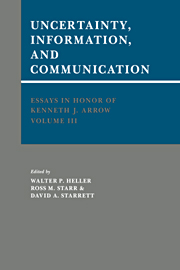Book contents
- Frontmatter
- Contents of Volumes I, II, III
- List of contributors
- Editors' preface
- Kenneth J. Arrow
- Contents
- PART I UNCERTAINTY
- 1 Negotiation in games: a theoretical overview
- 2 Repeated moral hazard with low discount rates
- 3 Existence, regularity, and constrained suboptimality of competitive allocations when the asset market is incomplete
- 4 Asset pricing theories
- 5 Independence versus dominance in personal probability axioms
- 6 Univariate and multivariate comparisons of risk aversion: a new approach
- PART II INFORMATION, COMMUNICATION, AND ORGANIZATION
- Publications of Kenneth J. Arrow
- Author index
3 - Existence, regularity, and constrained suboptimality of competitive allocations when the asset market is incomplete
Published online by Cambridge University Press: 05 November 2011
- Frontmatter
- Contents of Volumes I, II, III
- List of contributors
- Editors' preface
- Kenneth J. Arrow
- Contents
- PART I UNCERTAINTY
- 1 Negotiation in games: a theoretical overview
- 2 Repeated moral hazard with low discount rates
- 3 Existence, regularity, and constrained suboptimality of competitive allocations when the asset market is incomplete
- 4 Asset pricing theories
- 5 Independence versus dominance in personal probability axioms
- 6 Univariate and multivariate comparisons of risk aversion: a new approach
- PART II INFORMATION, COMMUNICATION, AND ORGANIZATION
- Publications of Kenneth J. Arrow
- Author index
Summary
In 1951, Kenneth Arrow and Gerard Debreu independently established what is still today probably the central argument of economic theory: They proved that any competitive equilibrium of an “Arrow–Debreu” economy is Pareto optimal. In 1954, they jointly discovered a subclass of economies, now referred to as convex Arrow–Debreu economies, for which competitive equilibria always exist. Debreu (1970) introduced the techniques of differential topology into economics and proved that the competitive equilibria of smooth, convex Arrow–Debreu economies are generically locally unique. In this chapter we extend the study of the existence, optimality, and local uniqueness of competitive equilibria to a wider class of economies: The class of economies, suggested by Arrow in 1953, in which the asset market is possibly incomplete. We show that when assets pay off in some numéraire commodity, equilibria exist and are typically locally unique, even when the asset market is incomplete. However, when the asset market is incomplete, competitive equilibrium allocations are typically Pareto suboptimal in a strong sense: The market does not make efficient use of the existing assets.
The old proof of Pareto optimality (see, e.g., Lange 1942) essentially assumed differentiable utilities and strictly positive competitive equilibrium allocations. One considered the problem of how to divide the aggregate endowment to maximize the utility of one individual subject to the constraint that no other individual suffer a loss in utility. It was pointed out that the first-order necessary conditions for a strictly positive allocation, x, to be a local maximum to this problem are satisfied if the allocation is a competitive equilibrium. Moreover, it is now commonly known that in a concave programming problem the first-order necessary conditions are also sufficient for global optimality.
- Type
- Chapter
- Information
- Essays in Honor of Kenneth J. Arrow , pp. 65 - 96Publisher: Cambridge University PressPrint publication year: 1986
- 198
- Cited by



